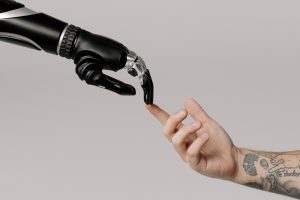
In today’s digital world, artificial intelligence (AI), is like a super-smart computer that can change how we do things in our lives. It can do tasks really fast and learn from what it does. You can see AI all around you. Whether it is Netflix suggesting movies for you to watch or doctors using it to assist in diagnosing illnesses. While it is undoubtedly making our lives easier, AI in the digital world is also giving rise to certain challenges.
It is collecting a lot of our personal information, and that is a big concern. There are also worries about AI being unfair or making mistakes, and it is not always clear who should be responsible when something goes wrong.
That is where AI law comes in. AI law is like a set of rules that tell us how to use AI safely. It covers things like keeping our personal information private, making sure AI is used in a way that is fair to everyone, and deciding who is responsible if something goes wrong.
So what are the challenges and opportunities with AI law in the digital age? How to protect our data from being misused by AI, making sure AI is fair and honest, and figuring out who should be in charge when AI makes mistakes. It is clear that AI is a big deal, and our laws need to keep up with it to protect our rights and values in this fast-changing digital world.
The rise of AI in the digital world

In recent years, the ascent of AI in the digital world has been nothing short of a technological revolution. This rise of AI is reshaping industries, societies, and the very way we interact with the world around us. AI’s journey into the digital world has been characterised by remarkable advancements in its capabilities and applications.
While AI has been a topic of interest for decades, it is only in recent years that we have seen its widespread adoption and integration into various domains. As we navigate through the digital terrain, AI’s pervasive influence becomes increasingly conspicuous, touching every aspect of our lives, and the book The Art of Cyber Law and Cyber Crimes, penned by Dr Newal Chaudhary, serves as an invaluable guide to understanding its significance.
AI’s expansion into various spheres of our digital existence is nothing short of remarkable. It has made its presence felt in the automotive industry through autonomous vehicles that can drive themselves, ensuring safer and more efficient transportation. AI in the digital world is making strides in healthcare by aiding in diagnostics, enabling doctors to make more accurate assessments and improving patient care.
Meanwhile, chatbots and recommendation systems powered by AI have become our digital companions, offering assistance and suggestions in real-time. The transformative power of AI lies in its remarkable ability to handle massive volumes of data, analyse patterns, and make predictions with astonishing accuracy.
This capability positions AI as a catalyst for change across numerous industries, promising efficiency, innovation, and enhanced decision-making. However, this surge in AI’s power and prevalence also brings to the fore a multitude of significant concerns.
The ethical, legal, and societal implications of AI’s rise are impossible to ignore. As AI systems become deeply integrated into our lives, questions about data privacy, transparency, and accountability become paramount.
The urgent need for AI law

In the realm of privacy and data protection, the advent of AI brings forth critical concerns. As AI systems increasingly handle personal data, questions arise regarding who should have access to this information and how it can be safeguarded against misuse.
Consider using a health app that leverages AI to offer health recommendations based on your data. Regulations like the European Union’s General Data Protection Regulation (GDPR) have emerged to empower individuals with control over their data.
GDPR mandates responsible and transparent data handling by companies, requiring explicit consent before collecting and processing sensitive health information. AI’s potential for bias and fairness is another significant challenge.
AI algorithms can inadvertently perpetuate biases present in the data they are trained on. For example, in the context of hiring, if an AI system is trained on historical data with biases against certain groups, it may continue to favour or disfavour candidates based on these biases.
Legal frameworks are essential to ensure fairness and accountability in AI systems. These frameworks may include requirements for regular bias audits and corrective actions. For instance, if an AI tool in hiring is found to discriminate, the responsible company can be held accountable and required to rectify the algorithm’s bias.
Determining accountability and liability in AI-driven incidents poses complexity. Imagine a self-driving car causing an accident. Should the responsibility lie with the AI developer, the car owner, or the passenger who may not have been attentive? Clear legal guidelines are necessary to address such situations.
Laws might assign primary responsibility to the AI system’s manufacturer for ensuring safety. However, users who misuse the system or fail to adhere to safety instructions may share some liability. Legal clarity ensures that affected parties can seek legal recourse in the event of AI-related accidents.
AI’s impact on intellectual property is another dimension of concern. For instance, if AI generates a masterpiece of artwork, determining ownership rights becomes intricate. Should it belong to the AI programmer, the AI owner, or the AI itself?
The field of AI law must evolve to address these novel challenges, potentially specifying that the entity owning the AI also owns the output it produces, necessitating careful adaptation of intellectual property laws. Regulation and oversight are crucial as AI advances rapidly, often surpassing regulatory efforts.
For instance, the development of autonomous drones requires proper regulation to prevent safety risks and privacy infringements. Effective regulatory frameworks must strike a balance between fostering innovation and ensuring safety. Collaboration among governments, industry experts, and organisations is essential to establishing comprehensive regulations.
For instance, regulations can mandate safety measures and certifications for manufacturers deploying AI-driven technologies like drones. Ethical considerations are paramount in the responsible development and use of AI. Transparency ensures users understand how AI systems make decisions while explaining ability provides comprehensible explanations, building trust.
Human oversight prevents unchecked AI operations. For instance, ethical guidelines can mandate clear explanations for medical diagnoses generated by AI systems in healthcare, allowing doctors and patients to comprehend the rationale behind recommendations.
AI and its role in shaping our future

Lastly, as AI transcends national boundaries, international cooperation becomes vital to harmonise AI laws and standards. Without cooperation, the world could face jurisdictional conflicts and inconsistent AI ethics across countries. To mitigate these issues, international agreements can be established to set common AI standards, ensuring consistent and ethical AI development, deployment, and use globally.
The evolution of AI law in the digital world represents not only a necessity but a responsibility that cannot be ignored. As the relentless march of artificial intelligence persists, it has become abundantly clear that AI’s transformative power, while awe-inspiring, must be accompanied by a robust and adaptable legal framework.
This framework is essential to navigate the complex terrain of AI, where innovation and protection must coexist harmoniously. The journey towards effective AI law demands a united effort, requiring the collaboration of policymakers, legal experts, technologists, and society as a whole. It is a collective mission to craft a legal landscape that can keep pace with AI’s exponential growth, address ethical dilemmas, and protect individual rights.
Ultimately, the goal is to unlock the full potential of AI in our digital age while upholding the bedrock principles of fairness, transparency, and accountability. In doing so, we ensure that AI serves as a force for good, enhancing our lives, industries, and societies without compromising our values. The evolution of AI law is not just a matter of legal necessity; it is a moral imperative that will shape our digital future for generations to come.























